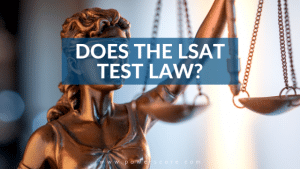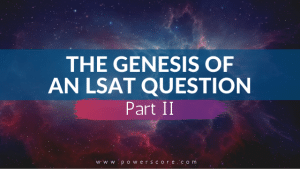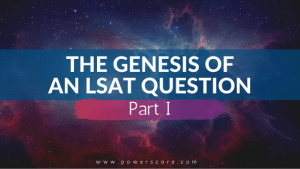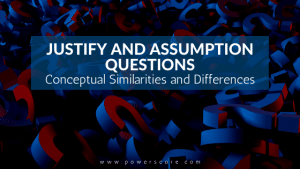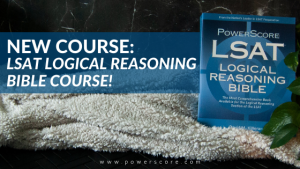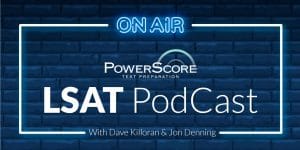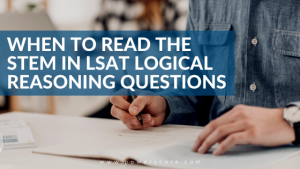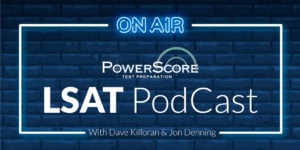Do the Books Change Every Year? Yes!Each year I make revisions and updates to the LSAT Bibles, and there are several different reasons for that: First, new LSATs are released each year. I make changes to some of the content to account for new directions taken by the test makers. This includes adding new sections and changing others. Second, I regularly talk with LSAT students and also teach various sessions throughout the year. The feedback … [Read more...]
3 Reasons NOT to Read the Question First
This is an issue that comes up quite commonly with students; some have a favorite question type, and prefer to attack those first in a given section. Others note the potential advantage of knowing what to look for before even beginning to read the stimulus. Below are three reasons that I suggest NOT reading the question first, but instead attacking each logical reasoning question in this order: Stimulus, Question, Answer Choices. 1. "Seeing the … [Read more...]
Does the LSAT Test Law?
According to LSAC, the Logical Reasoning portion of the LSAT is designed to "evaluate the ability to analyze, critically evaluate, and complete arguments as they occur in ordinary language. These arguments mirror legal reasoning in the types of arguments presented and in their complexity, though few of the arguments actually have law as a subject matter."I frequently echo this final disclaimer at the start of my classes. The LSAT is not a … [Read more...]
The Genesis of an LSAT Question, Part II
Continuing on with our discussion from Part I, let’s take the text from the article and turn it into a proto-LSAT Logical Reasoning stimulus: “In the country of Downlandia, over 100,000 people currently live in towns with populations of fewer than 100 residents. This is an increase of over 20,000 people from a decade ago.” With this very rough “stimulus” in hand (which at this point is just a fact set), we can examine the three question types … [Read more...]
The Genesis of an LSAT Question, Part I
The other day I was reading an article about a town in the US with just two residents. In the middle of the article, the following text caught my attention: “The 2010 Census found 13 hamlets with one or two residents, including Lotsee, Okla., Gross, Neb., and Bonanza, Utah. About 119,000 people live in towns with fewer than 100 residents, up from 79,000 a decade earlier. Mr. Cantrell suspects the increase is due largely to towns shrinking below … [Read more...]
Justify and Assumption Questions: Conceptual Similarities and Differences
Many students confuse Justify and Assumption questions. Of course, this is not news to those whose job is to confuse you (hint: they work in Newtown, PA). Consequently, you will often encounter Assumption decoys in Justify questions and vice versa. The trick is to know what you are looking for. And what you are not. Some basic concepts: In Justify questions, you need to identify a statement that is sufficient to prove the conclusion. In other … [Read more...]
New Course: LSAT Logical Reasoning Bible Course!
Today we are thrilled to announce the launch of our new LSAT Logical Reasoning Bible Course! This is the first step in what will become a full-fledged LSAT Bibles Course encompassing all three of our best-selling books. Let’s take a look at what this new course includes as well as our plans for the future.The New Course: Complete LR Mastery The new course is built around our well-known Logical Reasoning Bible. We have taken the content in … [Read more...]
Should You Work Backwards in Logical Reasoning?
Students often ask if working backwards in Logical Reasoning might be the way to go. After all, the reasoning goes, the hardest questions are typically towards the end of the section. So, if you tackle them early on, you will have more time to get them right without rushing. As you progress through the section, you will have less and less time left, but the questions will (presumably) get easier, so you have a higher chance of getting them … [Read more...]
Podcast Episode 85: Causal Reasoning Part II – Causality and Question Types
Wrapping up their comprehensive coverage of LSAT causality, Dave and Jon move from conceptual discussions of causation to an application-focused look at how causal reasoning is treated in the test’s various LR question types. Specifically, you’ll hear them address what to look for and how to best respond to causality in every context—from Weaken to Strengthen to Flaw and more—before touching on advanced cause and effect constructions, ensuring … [Read more...]
Ignoring a Possibility vs. Making an Assumption: What’s the Difference?
If you're taking the LSAT, you'll encounter Flaw questions in the Logical Reasoning section. Students commonly struggle with determining how the author talks about a stimulus. Specifically, when reading and analyzing a stimulus, how do you determine whether the author has ignored a possibility or has made an assumption? What clues within the stimulus and/or what reading strategies help differentiate these two author approaches in … [Read more...]
Podcast Episode 84: Causal Reasoning Part I – The Nature of Basic LSAT Causality
After several months of LSAT-Flex reviews and admissions cycle analysis, Jon and Dave are getting back to basics with a conceptual overview of causal reasoning. In this episode they examine precisely how LSAT causality operates, the central assumption that makes it so vulnerable, common points of confusion including correlations and conditionality, and the key distinctions between causation in premises and conclusions. If you’re looking for a … [Read more...]
Logical Negation: Identifying What to Negate in a Sentence
When negating a sentence, how do you know what specific word you need to negate if it's a long and complicated sentence?Students often ask this question, and it’s one that entails a more in-depth response than you may be expecting. We cover this topic in the Logical Reasoning Bible, Chapter 11, in the discussion of the Assumption Negation Technique™. However, even in such a comprehensive discussion, it's impossible to formulate categorical … [Read more...]
When to Read the Stem in LSAT Logical Reasoning Questions
Among LSAT experts, few issues are more hotly debated than this one: should you read the question stem before or after reading the stimulus in LSAT Logical Reasoning questions? PowerScore's position on this issue has always been clear: read the stem after reading the stimulus. On this issue, we are, shall we say, originalists. We follow the original design of the Logical Reasoning multiple choice question. Deviating from this design is largely a … [Read more...]
LSAT Podcast Episode 76: How to Resolve Resolve Questions
The first episode of the new year sees Dave and Jon tackle one of their all-time favorite Logical Reasoning question types: Resolve the Paradox! Tune in as they explain exactly how these questions work, outline the best approach for solving them, and reveal a comprehensive series of specific categories highlighting the test makers’ favorite Paradox scenarios. … [Read more...]



